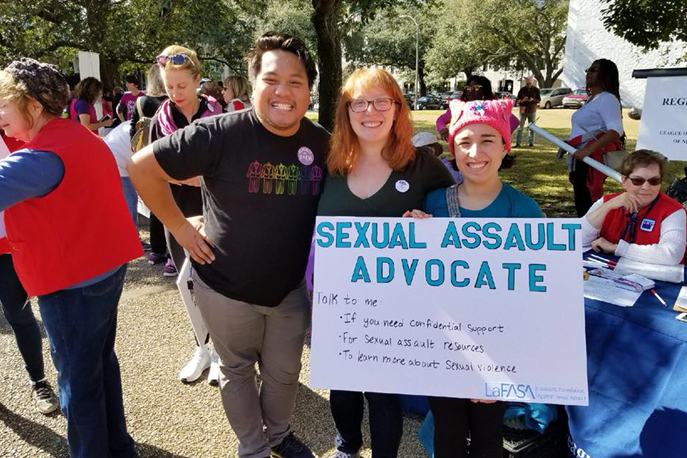When Jessie Nieblas heard the news that the Supreme Court had struck down a Louisiana law that would severely limit abortion access in her state, she celebrated alongside her fellow advocates at the Louisiana Foundation Against Sexual Assault (LaFASA) and the New Orleans Abortion Fund.
As LaFASA’s director of education and prevention, Nieblas recognizes a clear link between ending sexual assault and protecting abortion access – both are critical to ensuring women have bodily autonomy.
But Nieblas didn’t always see this connection.
“I grew up with fairly strident anti-choice beliefs,” Nieblas told RALIANCE. Prior to college, Nieblas held generally conservative Catholic views, and considered her opposition to abortion consistent with her disapproval of the death penalty and war.
But her college experience at UC Santa Barbara, where she became involved with feminist activism and sexual assault prevention, led her position to evolve. Through open conversations with friends, she came to trust those most impacted by anti-choice policies and determined that a pro-choice stance was ultimately more consistent with the views on bodily autonomy that informed her efforts to prevent rape and sexual assault on campus.
Nieblas remains a Catholic in the social justice tradition, and believes her faith is central to her commitment to pro-choice advocacy and sexual assault prevention, particularly in the way it guides her to think about how policies affect the poor and marginalized. “I’m not saying that you have be religious to do this work – certainly not,” she said. “But for me that’s where it’s happening.”
Faith can’t hurt in a deeply conservative state like Louisiana, where the battle for reproductive rights can often seem like a fight against the odds for the state’s three abortion clinics, which have for decades provided “compassionate care in the face of tremendous attacks,” according to Nieblas. Laws like the one struck down by the Supreme Court – often referred to as TRAP laws, for “targeted regulation of abortion providers” – create regulations that appear innocuous but are specifically designed to reduce abortion access.
In this most recent case, the law required the state’s clinics to have “admitting privileges,” or the right to send patients to a nearby hospital in case of complications. The privileges have no practical application: Abortions rarely lead to hospitalizations, and federal policy already requires hospitals to provide emergency care. Because receiving admitting privileges is often a challenge for clinics, the burden can force them to stop providing abortions.
Though Nieblas describes the Supreme Court case as a “victory,” she knows the fight’s not over. With states across the country continuing to pass TRAP laws and defending them in court, advocates in Louisiana and elsewhere must continue tracking cases working their way through the judicial system across the country, any one of which could ultimately threaten abortion access.
“It may not happen during our lifetimes, but we can create a world where people have bodily autonomy.”
Nieblas considers this fight particularly urgent for Louisiana’s Black and Brown women, who often receive inferior health care services and face worse health outcomes relative to their white counterparts, regardless of income.
Worse still, they are disproportionately impacted by a piece of federal policy called the Hyde Amendment, which forbids the use of federal funds to pay for abortions, except to save the life of the mother or in cases of rape or incest. Because Black and Brown Louisianans are often members of the military, federal employees, people who use Medicaid, or patients at the Indian Health Service, they receive health care through government systems that the Hyde Amendment forbids from providing the reproductive care they need.
“It may not happen during our lifetimes,” said Nieblas, “but we can create a world where people have bodily autonomy.”
To support abortion rights and sexual assault prevention, Nieblas recommends reaching out to your local abortion fund or rape crisis center to see how you can help. She also advises contacting your representatives to support the Women’s Health Protection Act, which would federally guarantee the right to access abortions and other reproductive health care. You can also donate to the Louisiana Foundation Against Sexual Assault here and the New Orleans Abortion Fund here.

